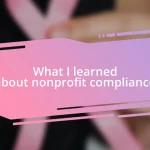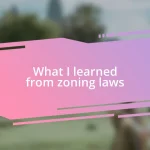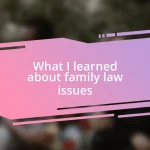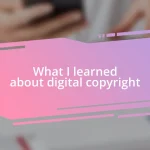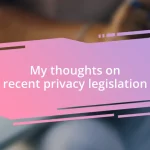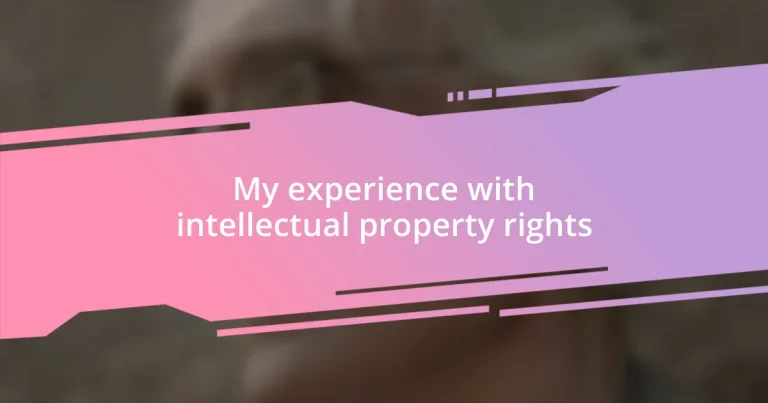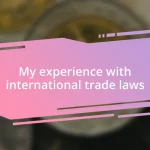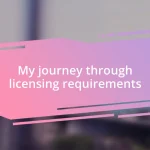Key takeaways:
- Understanding and protecting intellectual property rights (IPR) is essential for creators to safeguard their original work from exploitation and unauthorized use.
- Experiences with IPR, such as securing patents and trademarks, highlight the emotional and financial implications of idea theft and the importance of proactive measures in creative endeavors.
- The evolution of technology creates new challenges and opportunities for IPR, emphasizing the need for continuous learning and global collaboration among creators to address future complexities.
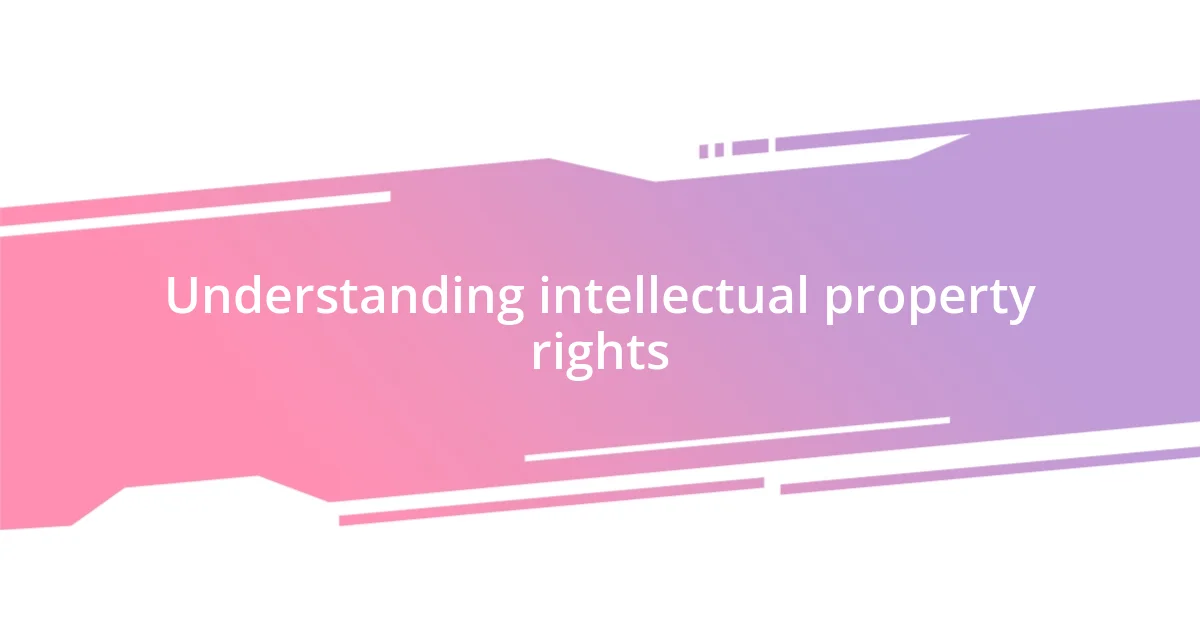
Understanding intellectual property rights
Understanding intellectual property rights is crucial for anyone navigating the world of creativity and innovation. I remember a time when I poured my heart and soul into designing a unique logo for a personal project, only to discover a similar one online. The shock of realizing someone could legally claim my idea made me appreciate how these rights protect creators from having their original work exploited.
Intellectual property encompasses various types of protections, including copyrights, trademarks, and patents, each serving a distinct purpose. Have you ever wondered what would happen if your favorite song suddenly became unrecognizable because someone else altered it and sold it as their own? That’s where copyright comes into play, ensuring artists retain control over their original compositions and preventing unauthorized use.
My journey with intellectual property rights has taught me the importance of safeguarding my creative efforts. I often reflect on how vital it is to know the ins and outs of these protections—like understanding the difference between a trademark and a patent—especially when launching new ventures. After all, navigating the complexities of intellectual property can mean the difference between thriving in your field or feeling overshadowed by someone else’s claims.
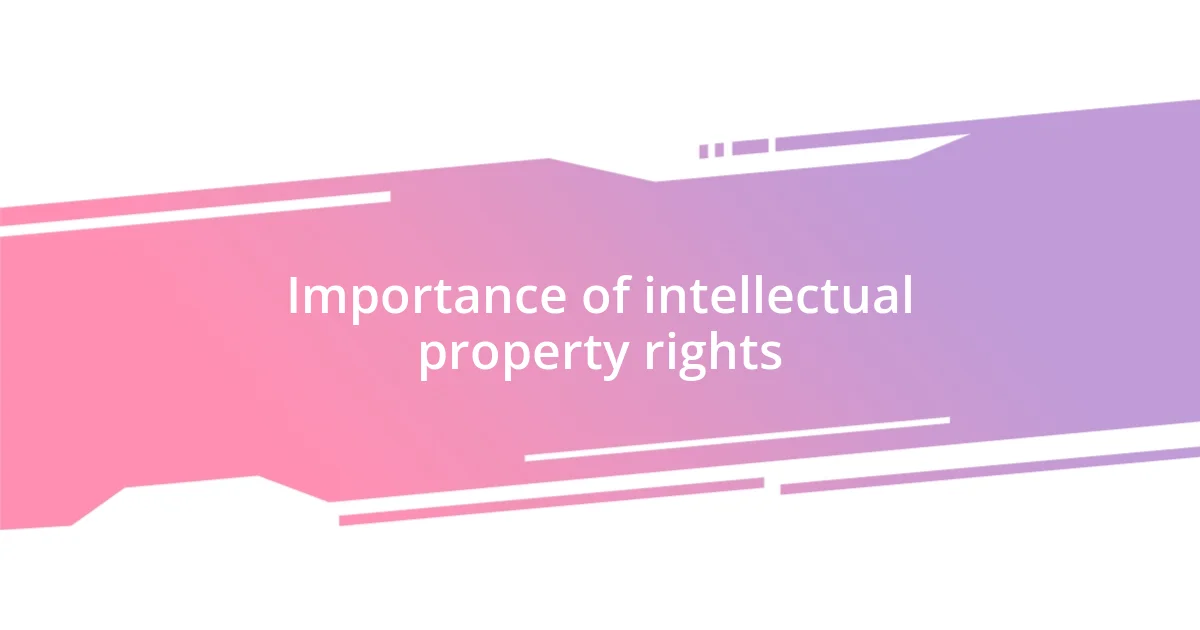
Importance of intellectual property rights
The importance of intellectual property rights can’t be overstated. When I first attempted to publish my original artwork online, I was ecstatic. But soon after, I saw my work used without permission on various platforms. It was an eye-opening experience that made me value the protective shield intellectual property rights provide. They not only safeguard my creations but also encourage innovation by ensuring that inventors and artists can reap the rewards of their hard work.
I sometimes reflect on a friend’s experience that further highlighted this significance. She developed a unique app that solved a persistent problem in our community. Unfortunately, other developers attempted to replicate her idea, which was disheartening. Because she had secured a patent for her app, she was able to defend her intellectual property. This situation reinforced how essential IP rights are in providing the legal backing needed when facing creators who might not have the same values of integrity.
In essence, intellectual property rights are foundational tools for building a fair creative economy. They empower us to chase our passions without fear of being undermined. Knowing that there are legal routes to protect what I create instills confidence in my work, allowing me to pursue my ideas without hesitation. It’s crucial for artists, entrepreneurs, and innovators alike to recognize this aspect of their journey.
| Type of Intellectual Property | Importance |
|---|---|
| Copyright | Protects original works, such as music and art, ensuring creators receive recognition and financial benefits. |
| Trademark | Safeguards brands and symbols, distinguishing a business’s products/services from competitors and building consumer trust. |
| Patent | Grants inventors exclusive rights to their inventions, encouraging technological advancement and economic growth. |
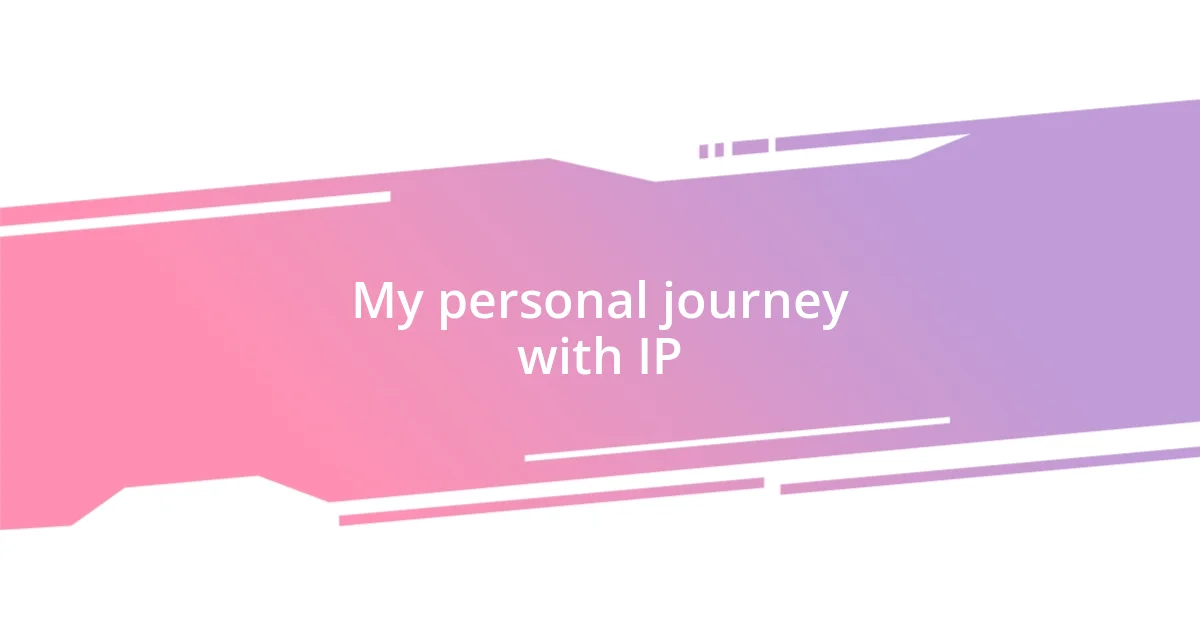
My personal journey with IP
As I ventured deeper into the world of intellectual property, my early misunderstandings quickly turned into valuable lessons. I clearly remember my first experience with a plagiarism incident. It was a bitter pill to swallow when I found my blog posts mirrored on a competitor’s site. This moment didn’t just frustrate me—it lit a fire within me to learn more about how to protect my ideas. I felt an overwhelming need to ensure that my work was shielded from those who didn’t respect the creative process.
Reflecting on my journey, I’ve had several eye-opening moments that made me appreciate the nuances of IP rights. For instance, when my friend shared her campaign to trademark an invention, I realized how daunting and rewarding the process can be. I could see the relief on her face once she received that certificate, knowing she had secured her idea. These experiences reinforced:
- The emotional toll of idea theft: It’s not just about losing an idea; it’s about losing a part of yourself.
- The thrill of creativity: Each original project is infused with passion, and protecting it allows that spark to flourish.
- The importance of community: Learning about IP rights isn’t just a solo endeavor; connecting with others walking the same path can provide invaluable guidance.
This journey has not only educated me about intellectual property but has also shaped my approach to creativity, instilling a sense of responsibility in sharing and protecting my work.
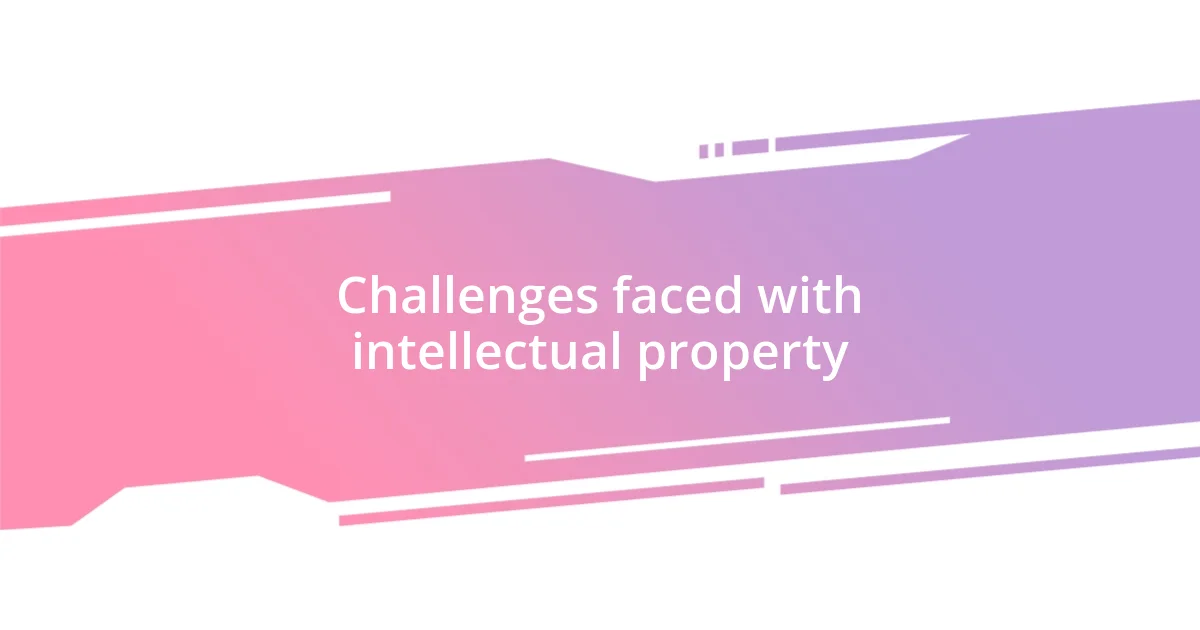
Challenges faced with intellectual property
Navigating the landscape of intellectual property often feels like wandering through a labyrinth. One challenge I faced was dealing with the constant fear of infringement. I remember attending a creative workshop where we shared our projects, and the anxiety of someone else “borrowing” my ideas was palpable. This uncertainty not only affected my creativity but also left me questioning how to balance sharing my work with protecting it.
Moreover, the complexity of IP law can be overwhelming. I once tried to apply for a trademark for a branding idea I had, and the process was more complicated than I anticipated. There were forms to fill out, fees to consider, and the stress of potential rejections loomed over me. At times, I found myself asking, “Is this really worth the hassle?” In the end, investing that effort not only taught me a lot about the legalities involved but also reinforced my commitment to safeguarding what I create.
Then there are the costs associated with protecting intellectual property. After enjoying some success, I quickly realized that securing a patent isn’t just about the application—there are maintenance fees and potential legal costs if you ever need to enforce your rights. I remember feeling a mix of excitement and dread as I calculated the expenses. It made me reflect: How can smaller creators compete with those who have deeper pockets? This realization highlighted the disparities in the creative world and fueled my desire to advocate for more accessible IP resources for all.
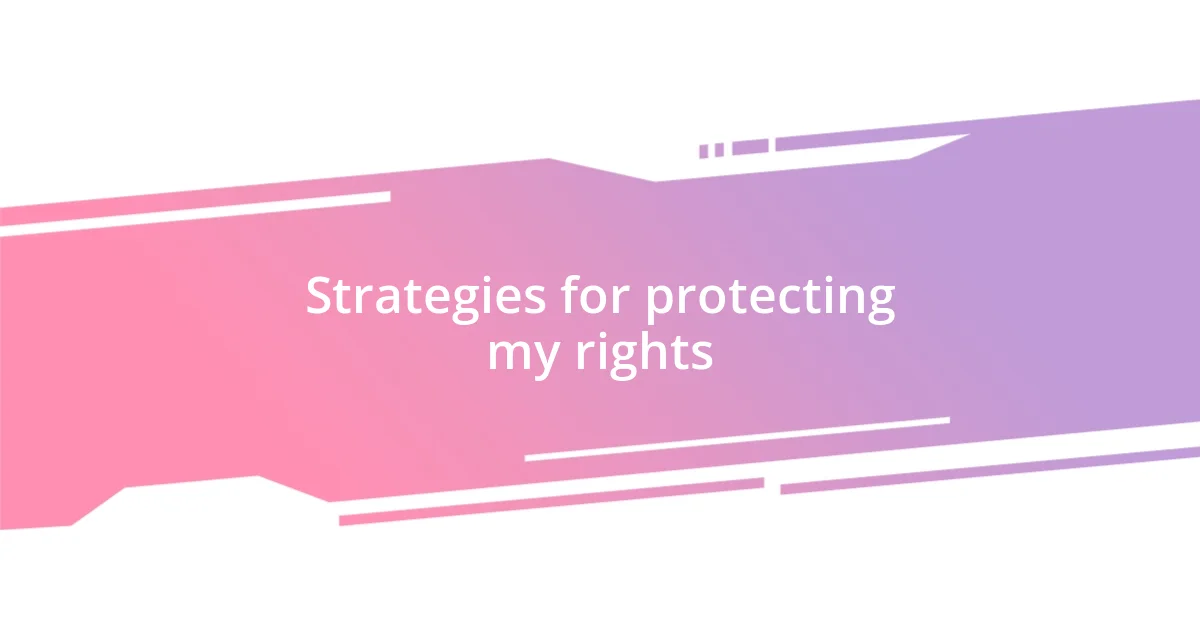
Strategies for protecting my rights
To protect my intellectual property rights effectively, I found that registering my work was a crucial first step. When I took the plunge to copyright my creative content, it felt empowering. I remember feeling a sense of ownership that hadn’t been there before; that little piece of paper symbolized my hard work and dedication. I often ask myself, “What would have happened if I hadn’t?” The potential for someone to use my ideas without permission is a thought that still sends a shiver down my spine.
Another strategy that proved invaluable was maintaining meticulous records of my creative process. I began to document my brainstorming sessions, drafts, and research. This practice became more than just a safeguard; it was a way to reflect on my journey and recognize growth. When I faced a challenge, such as someone suggesting an idea I thought was too similar to my own, I could confidently pull out my notes. It gave me peace of mind to know I had proof of my original thoughts and could claim rightful ownership.
Lastly, I learned the significance of networking with professionals in the field. During my first industry conference, I had the chance to connect with a copyright attorney who later became an invaluable resource. I often think of the conversations we had; they deepened my understanding of IP laws and introduced me to various avenues for protecting my work. Asking for help can feel vulnerable, but it’s essential. Who knew that opening up about my fears could lead to such meaningful connections?
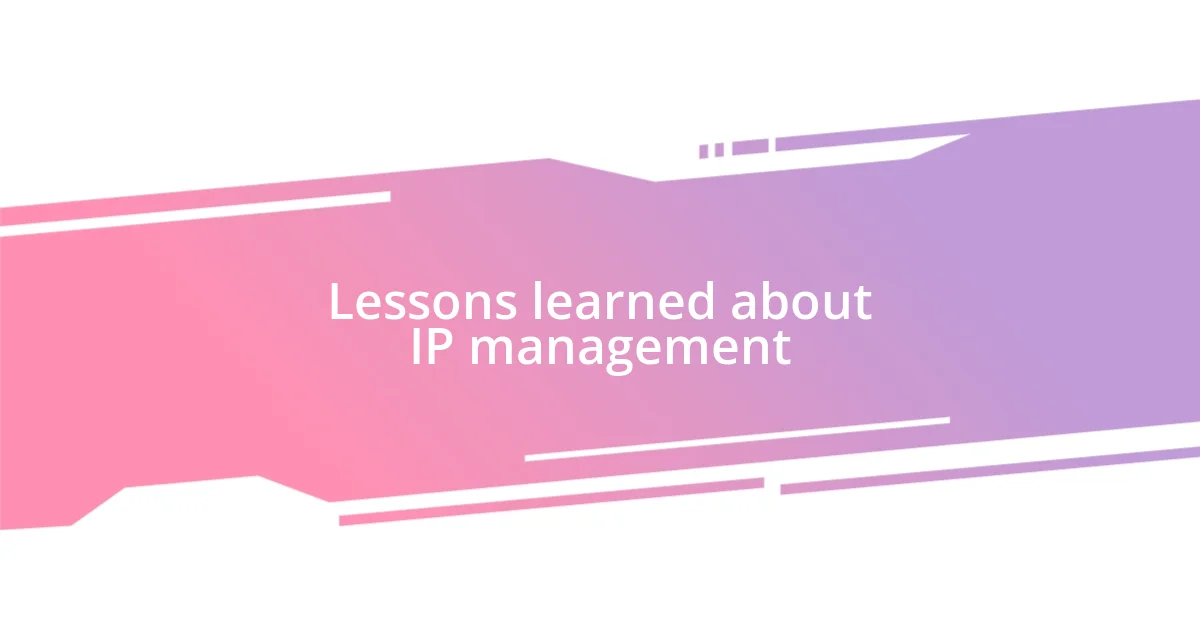
Lessons learned about IP management
One of the biggest lessons I learned about IP management is the importance of being proactive rather than reactive. I remember a moment when I almost lost a creative project I poured my heart into because I didn’t secure my rights early enough; the panic was real. It made me realize that waiting until something happened is a recipe for regret. Wouldn’t it be better to take preemptive action? Now, I see registration not as a chore but as my first line of defense.
I also found that understanding the nuances of IP can make a substantial difference. There was a time when I overlooked details in a licensing agreement—big mistake! This oversight taught me that never assuming anything is a key principle in IP management. I frequently catch myself thinking, “What did I really agree to?” Gaining clarity on contracts has been crucial in ensuring I’m truly protected, as well as empowering me in future negotiations.
Lastly, cultivating a mindset of continuous learning was essential. I’ve attended workshops and read extensively on IP rights, and each resource provided not just knowledge but confidence. At one point, I had to present my work at a local gallery, and rather than feeling intimidated, I felt equipped to discuss my rights and the importance of IP. I often find myself asking, “How can I better educate myself today?” This journey of ongoing education has transformed my approach and made me a stronger advocate for my own work.

Future outlook on intellectual property rights
Looking ahead, I can’t help but feel a mix of excitement and concern about the evolution of intellectual property rights. With technology advancing rapidly, I often wonder: how will we balance innovation with the rights of creators? For instance, I’ve noticed more discussions around artificial intelligence and its potential to generate content. This raises questions about ownership—if an AI creates a stunning piece of artwork, who truly holds the rights? This is a frontier that challenges our traditional notions of authorship, and it’s exhilarating yet daunting.
As I reflect on my journey, I think about how the digital landscape is changing the ways we protect our ideas. The rise of blockchain technology presents a fascinating opportunity for transparency and verification of ownership. I recall the first time I learned about NFTs (non-fungible tokens) and how they can secure original works in a whole new way. It felt like stepping into a sci-fi world where my digital art could have a unique, verifiable identity. But it leads me to question: are we fully prepared to navigate the legal implications that come with such advancements?
What resonates with me most is the potential for greater global collaboration in the realm of intellectual property. I’ve seen firsthand how connecting with creators from different countries can illuminate diverse practices and challenges. It sparks a thought: could a unified approach to IP rights be on the horizon? As digital borders continue to blur, I find it important to engage and share experiences with fellow creators worldwide. It’s through these interactions that I believe we will shape a future where intellectual property rights evolve to support innovation while honoring the spirit of creativity.





